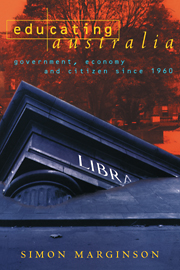Book contents
- Frontmatter
- Contents
- List of Tables
- List of Acronyms
- Preface
- 1 Introduction
- Part I The Modern Citizen 1960–1975
- Part II The Anti-citizen 1975–1990
- 4 The New Right and public policy
- 5 Individual and government
- 6 The New Right and education
- Part III The Economic Citizen 1985–1995
- Part IV The Multi-citizen 1990–
- References
- Index
6 - The New Right and education
Published online by Cambridge University Press: 05 June 2012
- Frontmatter
- Contents
- List of Tables
- List of Acronyms
- Preface
- 1 Introduction
- Part I The Modern Citizen 1960–1975
- Part II The Anti-citizen 1975–1990
- 4 The New Right and public policy
- 5 Individual and government
- 6 The New Right and education
- Part III The Economic Citizen 1985–1995
- Part IV The Multi-citizen 1990–
- References
- Index
Summary
‘Competition has got a bad name in education circles in recent years, but competition is itself a good thing. Moreover, competition is a fact of life. We live in a highly competitive environment, whether we like it or not. School education should help children to learn to cope with competition, it should teach them how to succeed, how to cope with occasional failure. It is futile and cowardly and ultimately self-defeating for schools to attempt to abolish competition … We all know that the Japanese school system is highly competitive and we all know that this can produce stresses for students. But our own system has become far too uncompetitive so that bright students are not challenged.’
‘Our education: nothing short of disaster’, editorial in The Australian, 6 January 1988.Prelude: ‘The lies they tell our children’ (1985)
On 25 January 1985, as parents were preparing for the beginning of another school year, the Business Review Weekly carried a worrying cover story on the deficiencies of government schools. Retention to the end of schooling was low in Australia, compared to other nations, it found. The national pool of talent was being ‘artificially constricted’. The schools were producing ‘a large number of unemploy-ables’. ‘If the education system was viewed as a business’, wrote editor Robert Gotdiebsen, ‘it would represent an enterprise that performed very badly’ (Gotdiebsen 1985: 27–28). On 28 January The Australian's editorial writer joined the argument.
- Type
- Chapter
- Information
- Educating AustraliaGovernment, Economy and Citizen since 1960, pp. 119 - 146Publisher: Cambridge University PressPrint publication year: 1997



